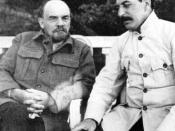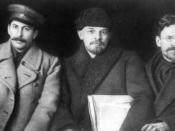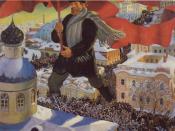LENIN'S BIRTH AND EARLY LIFE
Born Vladimir Ilyich Ulyanov, at Simbirsk (later called Ulyanovsk in his honor), he was the son of a school and civil service official and was drawn early to the revolutionary cause, especially when his brother, Aleksander I. Ulyanov, was executed (1887) for his participation in a plot on the life of Alexander III. Lenin's law studies at the Univ. of Kazan were interrupted when he was banished for revolutionary activities. He completed his studies independently and practiced law briefly, but soon renounced his legal practice, turning entirely to the study of the teachings of Karl Marx and to propagandizing among the workers, particularly in St. Petersburg. He was exiled to Siberia in 1895 and, when his exile ended (1900), he left Russia to continue his revolutionary activities abroad.
LENIN'S POLITICAL ACTIVITIES
In 1903, at a meeting of the Russian Social Democratic Labor party held in London, the party split into two factions, the Bolsheviks, headed by Lenin, and the Mensheviks.
Lenin continued to be the chief exponent of Bolshevik thought in the long struggles for supremacy against Plekhanov, Kautsky, and other less radical Marxists. With the outbreak of revolution in 1905, Lenin returned to Russia. His view that the Bolsheviks should take part in the second duma prevailed in 1907, but he left Russia later that year and subsequently mostly engaged in complex theoretical disputes.
Lenin was in Switzerland during the early years of World War I. In his view the war was an imperialist struggle; since imperialism was "the final stage of capitalism," it was a historical necessity that the war would offer opportunities for a revolution of the proletariat. Consequently, Lenin urged the proletariat to oppose the war by an international civil war against the capitalist class. After the outbreak of the...


